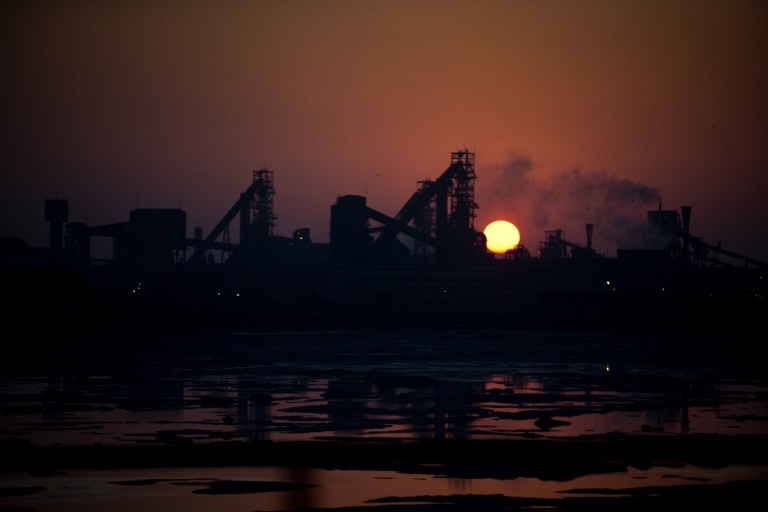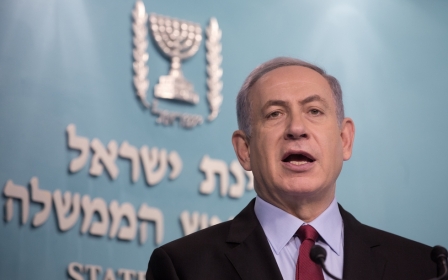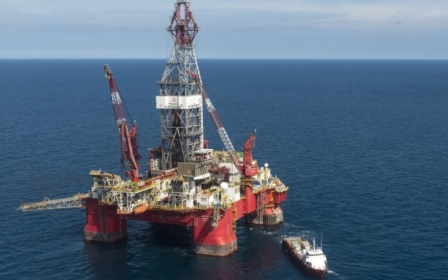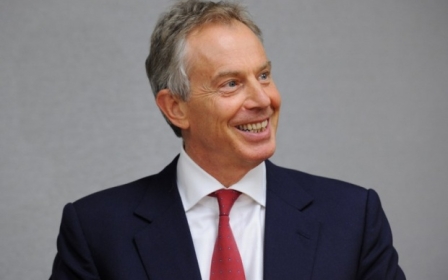ANALYSIS: Egypt's gas superfield find and its energy future

A month before the announcement of a superfield off the coast of Egypt, the Italian company that discovered it secured a deal that doubled the price of gas it will receive from the field, immunising it from price fluctuations.
In July, Egypt’s state-owned gas company, EGAS, and Italian energy company, ENI, agreed to raise the cost of gas from $2.65 per million British thermal units to between $4 and $5.88 per mmBtu, applicable to gas produced on new discoveries.
On Sunday, ENI announced that it had discovered Zohr, the “largest ever” natural gas field found off Egypt’s coast, which may hold as much as 30 trillion cubic feet (tcf) of gas.
If the estimates are accurate, the field would hold nearly 40 percent of the country's current proven natural gas reserves.
“This historic discovery will be able to transform the energy scenario of Egypt in which we have been welcomed for over 60 years,” ENI’s CEO Claudio Descalzi said in a statement when the field was publicly announced.
The find is good news for ENI’s balance sheet: Descalzi said the company already has infrastructure near Zohr in place, minimising the costs. ENI “will not have a problem to fund with our equity this project,” he told Bloomberg.
The company has been able to fix the gas price which, as Descalzi pointed out, are at a six-year low.
However, there are questions this week about the timing of the discovery’s announcement and the hike in the gas price.
“If this is in the UK or Switzerland, they would debate a long time before changing 10 cents,” said Hatem Azzam, a former secretary-general for the energy and industry committee in Egypt's parliament and a former member of Egypt’s parliament with 20 years of experience in the oil and gas industry, told MEE this week.
Azzam, whom Egypt officials have said is not welcome back in the country after he spoke out against the military coup in 2013, acknowledged that the price of gas would have needed to be raised to incentivise ENI, but said there should have been a public debate.
“I would not double the price in closed rooms like this a couple of weeks before announcing the deal,” Azzam said. “Why 100 percent? Why not 50 percent? Why not 20 percent? Where is the benchmark?”
“I think it’s pretty interesting that they announce it now because they must have known for a while that they had it,” energy analyst Mika Minio-Paluello said.
To test a field for its potential capacity, drill rigs would have had to be scheduled at least three months ahead of time, Minio-Paluello estimated.
“So it brings up the question – when did they really find it and was that before they renegotiated the price up?” he said.
ENI's spokesperson Cotalini Filippo, questioned whether the order made a difference, adding that the company did not respond to speculation.
MEE also contacted the Egyptian Ministry of Petroleum on Wednesday for comment, but was redirected to the country’s foreign journalist department in order to arrange an interview. The department had not responded to MEE’s request by the time of publication.
Rebounding sector?
Many analysts have argued that, after a decade that has seen Egypt indebted to oil and gas companies by as much as £7.5bn and transform from a net gas exporter to a net importer, the country has needed to incentivise multinationals to invest again.
At the end of last year, according to Capital Economics, Egypt’s arrears were down to $3.1bn. By March, when the economic development meeting at Sharm el-Sheikh was held, ENI and BP both announced multi-billion dollar investment packages.
The ENI find, say some, is a sign that Egypt’s troubled energy sector is rebounding.
“It now seems that these investments are starting to go through, the companies are picking up in exploration,” said Jason Tuvey, Middle East economist for Capital Economics. “Now we’ve actually seen the fruits of their labours, particularly with Sunday’s announcement.”
Minio-Paluello, however, questions the pay-to-play logic. ENI commitment to testing the field before the price was raised in July and assertions that the gas won’t be expensive to extract “questions this whole logic of don’t oil companies need a better deal otherwise they won’t be incentivised to do it,” he said.
While ENI has said that the Zohr project will be fast-tracked, gas is unlikely to come online for at least a couple of years – or maybe more, Platts energy analyst Sherif Ali Elhelwa told MEE.
“You are talking about an offshore field, very deep wells, 5,000-metres depth,” Elhelwa said. “Every mistake costs time. It doesn’t go smoothly. There will be mistakes and time delays so we are talking about at least a couple of years before a steady production.”
In the short term, this means Egyptian households will likely continue to see rolling blackouts at times of high-peak energy usage. Such blackouts were averted this summer because the government diverted electricity from factories and manufacturers, said Tuvey.
“The government sees it as easier to divert from factories to keep the lights on in homes,” he said.
Even ahead of the summer, Tuvey said, electricity consumption amongst the country’s manufacturers had fallen by 10 percent, while it had risen by 10 percent in households.
Elhelwa said some companies had been ordered to cut production one hour each day over the summer.
It’s a policy that has placated the public, which went out on the streets in 2011 in part because of the country’s energy crisis. But it can’t continue in the long run, Mohsin Kahn, an economist at the Atlantic Council, told Reuters.
"It's an understandable policy from a political standpoint," Khan said. "But the power cuts to factories have led to a serious economic problem... By not providing gas for factories, you are cutting the potential growth rate of the economy, not just today but also tomorrow."
Gas independence - at what cost?
Until its own gas is produced, Egypt will also continue to import more expensive liquid natural gas (LNG) which Elhelwa said costs the country about a third of its spending budget every three to four months.
Some analysts have suggested that Egypt could eventually export gas again after the Zohr find. Both this possibility and the prospect of Egypt’s gas self-sufficiency led Israeli Energy Minister Yuval Steinitz to call the find “a wake-up call” for Israel which has been slow to allow companies to produce its largest gas concession, Leviathan.
“The discovery of the massive gas field in Egypt is a painful reminder that while Israel sleepwalks and dallies with the final approval for the gas road map, and delays further prospecting, the world is changing in front of us, including ramifications for [Israeli] export options,” Steinitz said.
Khaled Abdel Badie, chairman of the state-run EGAS, however, has said that all of the gas from Zohr will be allocated to the internal market.
“The priority is Egypt’s internal needs; exports will come next, depending on the discoveries,” Badie told Bloomberg. “All the gas from this field will be allocated to the internal market. ENI has agreed to that.”
Egypt’s Oil Minister Sherif Ismail also said that Zohr’s discovery will not impact deals with companies to provide Israeli and Cypriot gas to Egypt.
But even with the prospects of gas self-sufficiency on the horizon for Egypt, Minio-Paluello and Azzam asked at what the cost the ENI deal comes for the Egyptian public.
“In the long run, it definitely means Egypt’s resources being handed over to a large foreign company on terms that aren’t being publicly debated,” Minio-Paluello said. “The average Egyptian is losing out to the regime and a foreign national.”
Putting aside questions of whether Egyptians could have negotiated a lower price with ENI, Azzam said even at the earlier $2.65 per BTMU gas price, Egyptians went into billion dollar debt with foreign companies and that was at a time when the Egyptian economy was stronger. “What will happen if they buy it at $5.88, especially in such a fragile economic situation?”
“Who is celebrating? It is ENI celebrating. And Sisi is celebrating locally,” he said. “Yes, it is a huge discovery. Nobody doubts this and it is very good for ENI for sure. But it is bad for the Egyptian economy and it might be very bad.”
Middle East Eye propose une couverture et une analyse indépendantes et incomparables du Moyen-Orient, de l’Afrique du Nord et d’autres régions du monde. Pour en savoir plus sur la reprise de ce contenu et les frais qui s’appliquent, veuillez remplir ce formulaire [en anglais]. Pour en savoir plus sur MEE, cliquez ici [en anglais].




